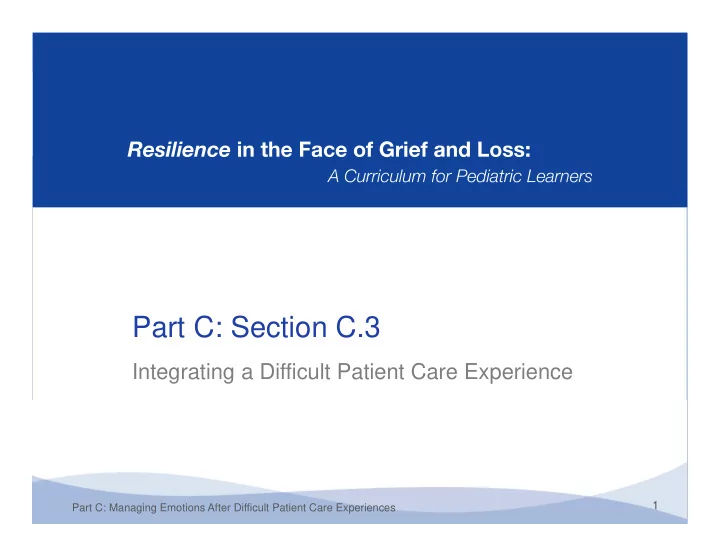

Part C: Section C.3 Integrating a Difficult Patient Care Experience 1 Part C: Managing Emotions After Difficult Patient Care Experiences
Objectives Demonstrate the ability to integrate difficult patient care experiences regarding medical errors, acute decompensation of a patient’s condition, or the death of a patient. o Acknowledge feelings of guilt, real or perceived, anger, sadness o Create a safe forum for discussion of medical errors and contributing factors o Understand and practice strategies for integration of these experiences 2 Part C: Managing Emotions After Difficult Patient Care Experiences
Strategies to Integrate the Stressful Experience o Debriefing o Reflective exercises o Writing a narrative o Personal journaling o Small group discussion of cases o Following patient deaths: o Attend the funeral o Dialogue with family, schedule a follow up visit o Send a sympathy card 3 Part C: Managing Emotions After Difficult Patient Care Experiences
Reflective Exercise o Think about a patient care experience where you felt guilt related to a medical error, sudden unexpected change in patient condition, and/or the death of a patient. o Complete the journaling worksheet provided. 4 Part C: Managing Emotions After Difficult Patient Care Experiences
Background o IOM report: ‘‘When Children Die’’ o The importance of acknowledging the reactions and concerns of all involved with a patient’s death, including the healthcare providers. o APA Educational Guidelines o Understand one’s personal responses and feelings when dealing with death and dying. 5 Part C: Managing Emotions After Difficult Patient Care Experiences
Background (continued) o Among pediatric residents who had used debriefing after a patient’s death guilt was acknowledged by 31% of the residents. o Not aggressive enough treatment (26%) o Resident inexperience (22 %) o Underestimated patient acuity (17 %) o Should have been more compassionate (13%) o Continued too aggressive of treatment (9%) o Resident not present at death (9 %) o Parent not present at death (4 %) 6 Part C: Managing Emotions After Difficult Patient Care Experiences
A Piece of My Mind A reflective article in JAMA in 1989 by Wendy Levinson and Patrick M. Dunn noted: o Important factor in guilt feelings is whether the physician perceives that he or she has made a mistake (whether or not a "real mistake" occurred). o Severity of the outcome of an error plays a key role in our response. – Wendy Levinson, MD Patrick M. Dunn, MD. A Piece of My Mind. JAMA, April 21, 1989, V 261, No 15 7 Part C: Managing Emotions After Difficult Patient Care Experiences
A Piece of My Mind o If patient or family thinks we have made a mistake, we ruminate more about the episode. o Physicians worry about perceptions of colleagues. o It has been found helpful to discuss our mistakes honestly with a trustworthy colleague. o Another's perspective helps avoid excessive self criticism. o Dialogue allows us to acknowledge our role and plans to do it differently next time. – Wendy Levinson, MD Patrick M. Dunn, MD. A Piece of My Mind. JAMA, April 21, 1989, V 261, No 15 8 Part C: Managing Emotions After Difficult Patient Care Experiences
Physicians’ Feelings about Errors o Focus groups by Gallagher regarding disclosure of errors: o Physicians experienced powerful emotions following a medical error. o Upset and guilty o Disappointed o Fearful o Anxious The emotional upheaval following an error led to o sleeplessness, difficulty concentrating, and anxiety. o Often the most difficult challenge was forgiving themselves. Thomas H. Gallagher, MD , et al. Patients' and Physicians' Attitudes Regarding the Disclosure of Medical Errors JAMA . 2003;289(8):1001-1007 9 Part C: Managing Emotions After Difficult Patient Care Experiences
The Heart of Darkness o Focus Groups and interviews on the impact of perceived mistakes on physicians o Ubiquity of mistakes o Infrequency of self-disclosure about mistakes to colleagues, family, and friends o Lack of support among colleagues o Degree of emotional impact on the physician o Influence of the physician's subsequent responses John F. Christensen, PhD, et al The Heart of Darkness: The Impact of Perceived Mistakes on Physicians J GEN INTERN MED 1992;7:424-431 10 Part C: Managing Emotions After Difficult Patient Care Experiences
Cases o Discuss each case in a small group o Discuss the questions posed 11 Part C: Managing Emotions After Difficult Patient Care Experiences
Following a Patient’s Death o Attend the funeral Allows one to grieve within a supportive community o Demonstrates respect and caring toward the family o Helps understand deceased patient in context of their family o and community o Dialogue with the family Phone call or follow up visit o Provide support and share sentiments o Consider visit to review autopsy findings, assess family’s o coping, clarify end of life care o Send a sympathy card 12 Part C: Managing Emotions After Difficult Patient Care Experiences
Resources o What resources are available at your institution? o Development of personal strategies for maintaining wellness (see Part D). o Most frequently mentioned strategy for maintaining wellness that is used by experienced physicians is to grieve losses. 13 Part C: Managing Emotions After Difficult Patient Care Experiences
Recommend
More recommend